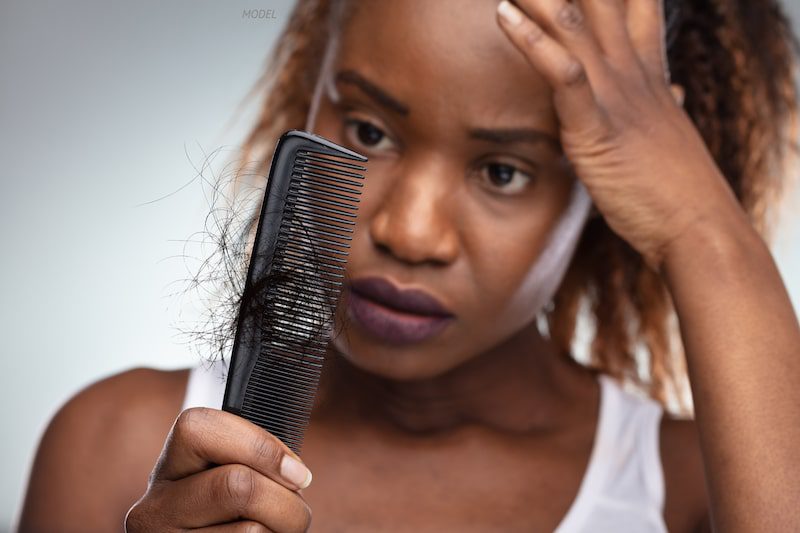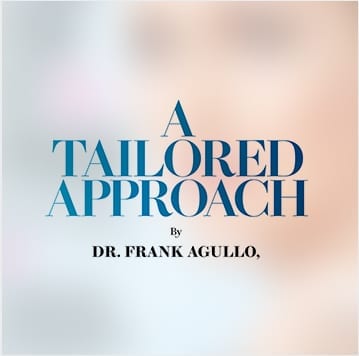November 17, 2021 | Female Hair Loss
4 Minute Read:
A woman’s hair is part of her identity. Therefore, seeing it thin (especially significantly) is emotionally trying to say the least. Even though hair loss in women is prevalent (reports state that over 50 percent of women over 40 have seen some level of hair thinning), it is not as readily accepted as male hair loss.
This leads many women to try almost anything to restore the look of full, healthy hair. This can include hair-regrowth shampoos (often containing high levels of biotin or argan oil), Toppik hair fibers spray or powders, hair toppers, and wigs.
While these can slightly help or mask the hair loss (which can come in the form of a widening part or overall thinness), it does not address the root cause. Therefore, results are often not what women want.

What Causes Female Hair Loss?
It is common for women to lose around 50 to 100 hairs each day. While this number can sound outrageous, it is the estimated “healthy” amount.
If you are losing more than that — or your hair is not regrowing, there may be cause for concern.
Women can suffer from female pattern baldness or male pattern baldness. Both of these are forms of alopecia. There are many types and classifications of alopecia (a term that simply means hair loss), and it is important to identify the underlying cause of hair loss to determine the right path.
Occasionally, women who suffer from significant hair loss have an underlying health concern that should be addressed first (or else you are simply masking the situation).
Common reasons for female hair loss include:
1. Genetics
Genetics are a primary cause of female pattern hair loss. If your mother, grandmother, or sisters suffer from hair loss, you may as well.
2. Thyroid or autoimmune conditions
Thyroid and autoimmune conditions affect hormone levels (by producing too much or not enough T3 and T4 hormones), which stops hair development at the root.
If you are suffering from a thyroid condition, it must be treated to see an improvement in hair growth.
3. Chemotherapy
It is a known fact that many chemotherapy drugs cause significant or complete baldness. Usually, a woman’s hair comes back after completing her chemo treatment; however, that does not stop her from having lingering effects.
Many women experience prolonged hair loss even after their hair has “returned.”
4. Pregnancy
While some women experience thicker hair during pregnancy (due to estrogen levels slowing the hair loss cycle), others experience significant hair loss. This is caused by decreasing estrogen levels and a hormonal imbalance.
Fortunately, this is temporary and can be helped by taking your prenatal vitamins.
5. Stress levels
Stress affects every part of our bodies, not just our minds. This can lead to hair loss as stress hormones force hair follicles into a resting phase — where hair growth does not occur.
Relaxation techniques and scalp massages can prove very successful.
6. Anemia
Iron deficiency (anemia) prevents oxygen from reaching the hair follicles. This can stop the hair growth phase and damage the existing hair.
7. Inadequate nutrition
You need the right vitamins and minerals to grow healthy, luscious locks of hair. This includes protein, vegetables, and antioxidant-rich fruits.
8. Hormonal changes
As you can see from the above list, many of the causes of hair loss have something to do with changes and imbalances in hormone levels. Whether these hormonal changes are temporary (pregnancy or menopause) or longer lasting, they should be addressed as they can affect hair growth.
9. And others
Unfortunately, this is just a small list of potential hair loss reasons. There are many more. If you are suffering from significant hair loss and do not fall into one of the above categories, consider asking your doctor to see if they can help identify a reason.
What Can You Do to Address Hair Loss?
For those bothered by seemingly permanent hair loss and who have tried natural remedies to no avail, medical or cosmetic treatment may be an option.
An initial, thorough examination with lab work can exclude most medical causes of female hair loss.
The treatments may include:
- PRP hair loss therapy
- Laser hair loss therapy
- Hair transplant surgery
- Prescriptions like Rogaine®, Minoxidil®, and/or Finasteride
- Hormone replacement
Interested in Learning More?
If you’re in the El Paso, Texas, area, and you would like to know more about female hair loss and treatments that might help, get in touch with Dr. Agullo and his team. They can answer your questions and schedule a consultation with a board-certified plastic surgeon and hair loss specialist.
Call (915) 590-7900 today, or use the online contact form. #Stay Beautiful



